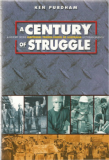Ken Purdham
Bachelor of Arts History & Politics
Diploma of Professional Writing & Editing



In my view, unionism is a belief. It’s the standing together in collective strength for the good of everyone because the voice of many is more likely to be listened to than the voice of the individual. Unions are no more than people standing together in an organised way. As organisations they provide an educated element to a cause, a technical resource and an order of working people. As such unions put forward compelling arguments that the individual may not otherwise be able to. But it’s the standing together of the many that gives strength to the voice of the people. Without that strength, the voice more often than not, is ignored.

Click picture to march back to the top of the page


ETU Historian
Click to ETU website
Echoes Of Tolpuddle
When these workers kicked up, their weekly wage was reduced to eight shillings a
week, then seven with the threat to reduce it to six. Even now, nearly two-
Those six farm labourers decided to form a friendly society, swearing an allegiance
in a little ceremony in a small cottage in Tolpuddle. In fear of that strength of
collectivism the masters had words with the local judiciary. George and his mates
were locked up and posters were put up around the district saying anyone forming
a union is liable to seven-
I shall not soon forget the address of the judge to the jury summing the evidence… if such societies were allowed to exist, it would ruin masters, cause a stagnation in trade, destroy property…
This was to be no slap on the wrist. It wasn’t illegal to form a union but by judicial
sleight-
…there are cases in which, whatever may be the intention of the parties, the effect… upon the public security is of such a nature that the safety of that public does require a penal example to be made…
George was sent to Hobart as a convict, while his brother and four mates were sent to Sydney.
In 2006 a switchboard company refused to pay its workers their week’s wages because
they refused to work overtime at the week-
Almost two-
In 1969, in Australia, Tramways union secretary, Clarrie O’Shea was jailed for refusing to hand over his union’s books to the judiciary. In the year 2000 the ETU Secretary, the AMWU Secretary and an AWU organizer had fines imposed on them and were threatened with jail for meeting with their members during a Campaign 2000 dispute when the courts forbid them to address them.
Thankfully, when injustice goes to an extreme, people will rebel.
Once the news of the injustice of the Tolepuddle workers came out, protests began to grow across the land, not only to the severity of the sentencing but to the legal questionability. Thousands of people signed petitions against the convictions and close to half a million people came out onto the streets in protest.
One hundred and thirty years later more than a million people across Australia came
out into the streets to protest at the jailing of Clarrie O’Shea. Anonymous donors
paid the fines of the Campaign 2000 unionists rather than continue the battles of
injustice. People came out into the streets again in 2007 and marched against the
WorkChoices legislation, then booted out an anti-
The Tolpuddle workers were eventually given free pardons although they were never told nor were the authorities in any hurry to arrange a passage home. George Loveless learnt of his free pardon when he read it in an old newspaper and it was another two years before the others were returned to England.
The echoes that ring true to this day are that the battles of injustice are only won because of people’s action; people standing together on mass, as they did for the Tolpuddle workers, Clarrie O’Shea and against WorkChoices.
Masters don’t like it when workers stand together because they do make a difference.
Corporate greed is the driver to maintain record profits. Healthy profits aren’t good enough. Sharing the wealth is not an option. There’s a masters ideological need to drive down wages and conditions of workers whether it be by removing penalty rates or using loopholes within the wages system to allow agreements to be torn up in pursuit of more profit.
Driving down wages is a corporate doctrine, a mantra, an insatiable need. Today’s arguments are that increasing the lowliest wage earners will increase inflation while ignoring the excessive profit making that is driving up inflation. Businesses believe they have a right to make whatever profits they like and wage earners must facilitate that by wage stagnation or reduction. Economic policy is such that it includes the need for a pool of unemployed rather than for full employment.
There will always be need to come out on mass and say; Enough is Enough!
History has shown there is no better way than to stand together with one voice and if George Loveless could stand alongside us today, he’d say, as he did then;
Arise, men (and women) of Britain (Australia) and take your stand! Rally round the
standard of Liberty, or forever lay prostrate under the iron hand and money-
References:
Books
George Loveless; Victims of Whiggery; Privately printed by Cox Kay Pty. Ltd.; Hobart 1946
Graham Padden, (compiled by); Tolpuddle: An historical account through the eyes of
George Loveless; London, WC1B 3LS; 1997
Ken Purdham; A Century of Struggle; Hyland House Flemington, Victoria, 3031; 2002
Ken Purdham; The Challenge of Change; Electrical Trades Union of Victoria;
Nth Melbourne, 3051; 2019
The Story of the Tolpuddle Martyrs; Compiled by Trade Union Congress; London,
WC1B 3LS; 1991
Article
W F Wood; Early Martyrs of Unionism: The Epic of the Six Inspired Peasants; The Victorian
Printers Operatives’ Union; Melbourne; 1978

Driving through Dorchester, England on holiday some time back, I suddenly started yelling; Stop the Car! Stop the Car! The others in the car looked at me like I was a lunatic but we had just driven into the village of Tolpuddle, a holy grail of trade unionism. I jumped out of the car, almost before it had stopped, and breathed in the same air that six farm labourers’ who were to become the Tolpuddle Martyrs did almost two hundred years before me.
Their story is one of many echoes and parallels that still resonate today.
In 1834 those farm labourers asked to be paid the same money as workers in neighbouring districts; it was ten shillings a week; they were being paid nine. George Loveless and his mates were told they’d get nine and like it. George wrote in his journal;
We were told that we must work for what our employers thought fit to give us, as there was no law to compel masters to give any fixed sum of money to their servants.